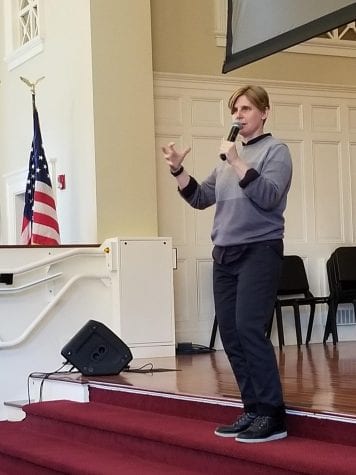
The shock, horror, media frenzy, and ensuing national conversation surrounding the murder of Matthew Shepard happened 20 years ago. The head writer of the award-winning “Laramie Project,” Leigh Fondakowski, says that the play, unfortunately, does not feel dated.
“Here we are 20 years later, and I’m still waiting for the time when ‘The Laramie Project’ feels historical,” Fondakowski, an Easthampton native, told the Williston student body on Friday, September 21. “It should feel outdated, like and old story, but it could still happen, anywhere in the country.”
It’s a tragedy, Fondakowski said, that despite advances in gay rights since the Shepard murder, including anti-discrimination laws and the right to marry – “that threat of violence persists.”
The Williston Theater Department will stage “The Laramie Project” on October 25, 26, and 27.
The event that precipitated Fondakowski’s play took place on Oct. 6, 1998, when Matthew Shepard, a 21-year-old freshman at the University of Wyoming, was robbed at gunpoint, beaten, struck 27 times with the butt of a gun, tied to a fence, and left for dead on the outskirts of town by Russell Henderson and Aaron McKinney. After being found alive the next morning by a mountain biker and flown to a hospital in Colorado, Shepard died on October 12.
As national media descended upon Laramie in the weeks following the murder, something shifted, Fondakowski said: a new current spread through the town and the country. Friends began to talk about the crime, she said. [Shepard’s] friends noted “it seemed like much more than a robbery gone bad.” The scope widened. “The national discussion turned to hate crimes” she said. “In 1998 nobody talked about anti-gay hate crimes.”
Twenty-eight at the time, Fondakowski was a member of the Tectonic Theater Company. Along with Artistic Director Moisés Kaufman, ten members of her troupe went to Laramie as the media trucks were leaving, armed with “our little cassette recorders,” ready to listen.
“We just started to talk to people and the most amazing thing happened,” she said. “People in town were hurt by how the media portrayed them ‘as cowboys, rednecks.’”
“People said, ‘The media got it wrong, we want you to get it right,’” Fondakowski recalled.
Fondakowski and her fellow actors and writers stayed for 10 days, during which they met with different pockets of the small community. Back in New York, they set to the work of transcribing interviews, and, in what she called a “tornado” of activity, wrote the play in just two weeks.
The first draft ended with Shepard’s death; as the trial of the two murderers got underway, Fondakowski and her theater company decided to follow the town for a year, see how it would change as a result of the crime and the trial. Fondakowski went back “about 10 times,” over the year, and the play was staged in Denver in February, 2000.
When the play’s run was up, Fondakowski said. “We thought it was this beautiful thing but now it’s over.” Then HBO called, and wanted to make “The Laramie Project” into a movie.
Fondakowski said she, at first, was reticent to let HBO take the reins and make the movie with A-list actors. But a co-writer in the Tectonic Theater Project, Greg Pierotti, assured her it was the right choice.
Pierotti told Fondakowski, “‘There could be a gay kid, thinking, ‘I’m all alone, what do I do, I don’t feel safe, I’m scared and ashamed of who I am.’ That kid could watch the film and feel ok.”
Fondakowski told the crowd she admired Williston for taking on “The Laramie Project.”
“It’s not an easy play, it’s long, there’s lot of lines, difficult subject matter, the characters are hard to understand and portray, and it can be dark in places, very dark.”
But, she added, the enduring legacy of the horrific incident is that “there’s something [in the play] that allows love to be present. There’s something in that play [that makes] differences melt away, so even though there are characters who really disagree with each other, and homophobia that abounds, somehow the play creates a container for honest dialogue, for different viewpoints, for people to butt heads with their opinions but be in the same space together.”
Leigh Fondakowski was the first visiting artist of the year to appear as part of the Grum Project, a five-year artist-in-residence program funded by a generous alumna. Fondakowski worked with theater students during their rehearsal of the “The Laramie Project,” teaching what she called “moment work,” and asking actors to maintain their sense of wonder by “seeing things in a different light.”
“The Laramie Project,” directed by Emily Ditkovsi, with set design by Charles Raffetto and costume design by Ashley Tyler, will run October 25-27.
